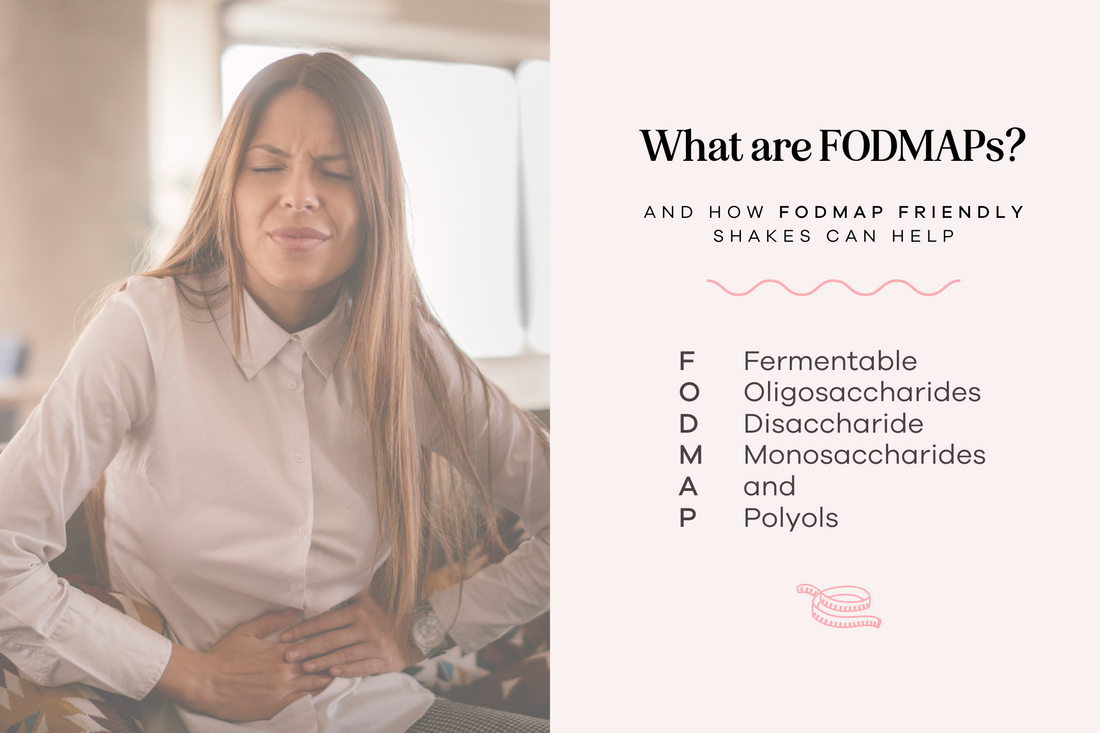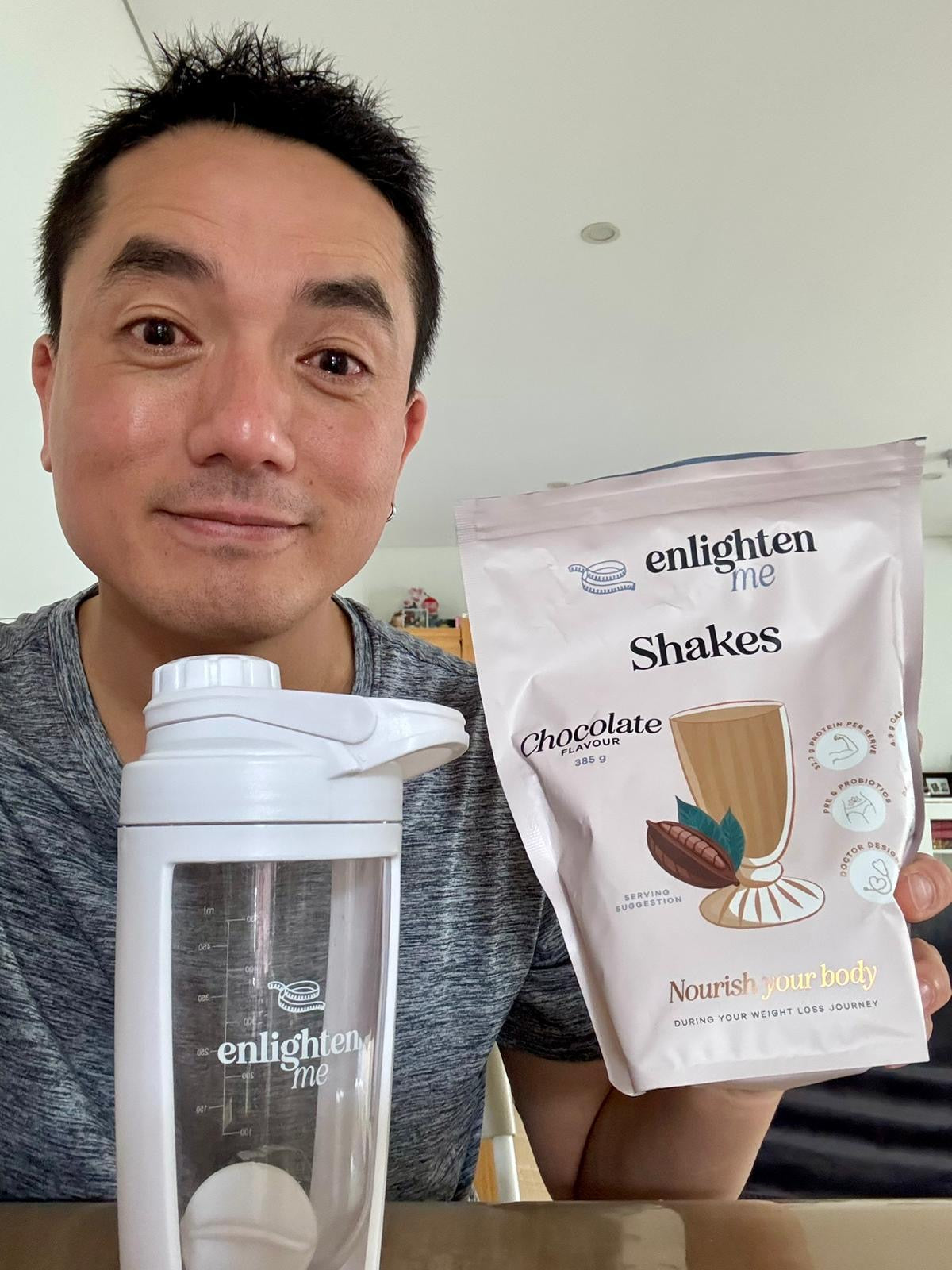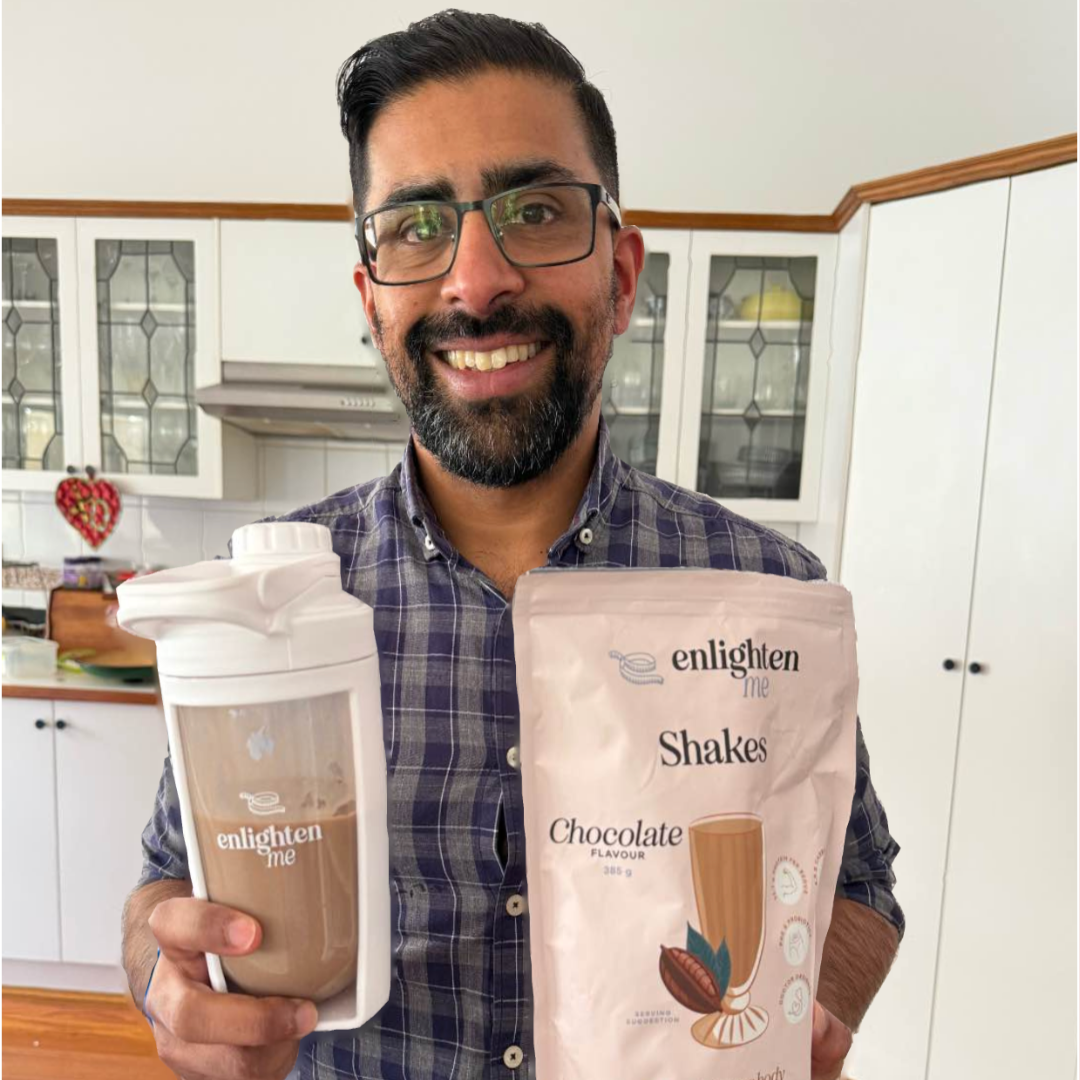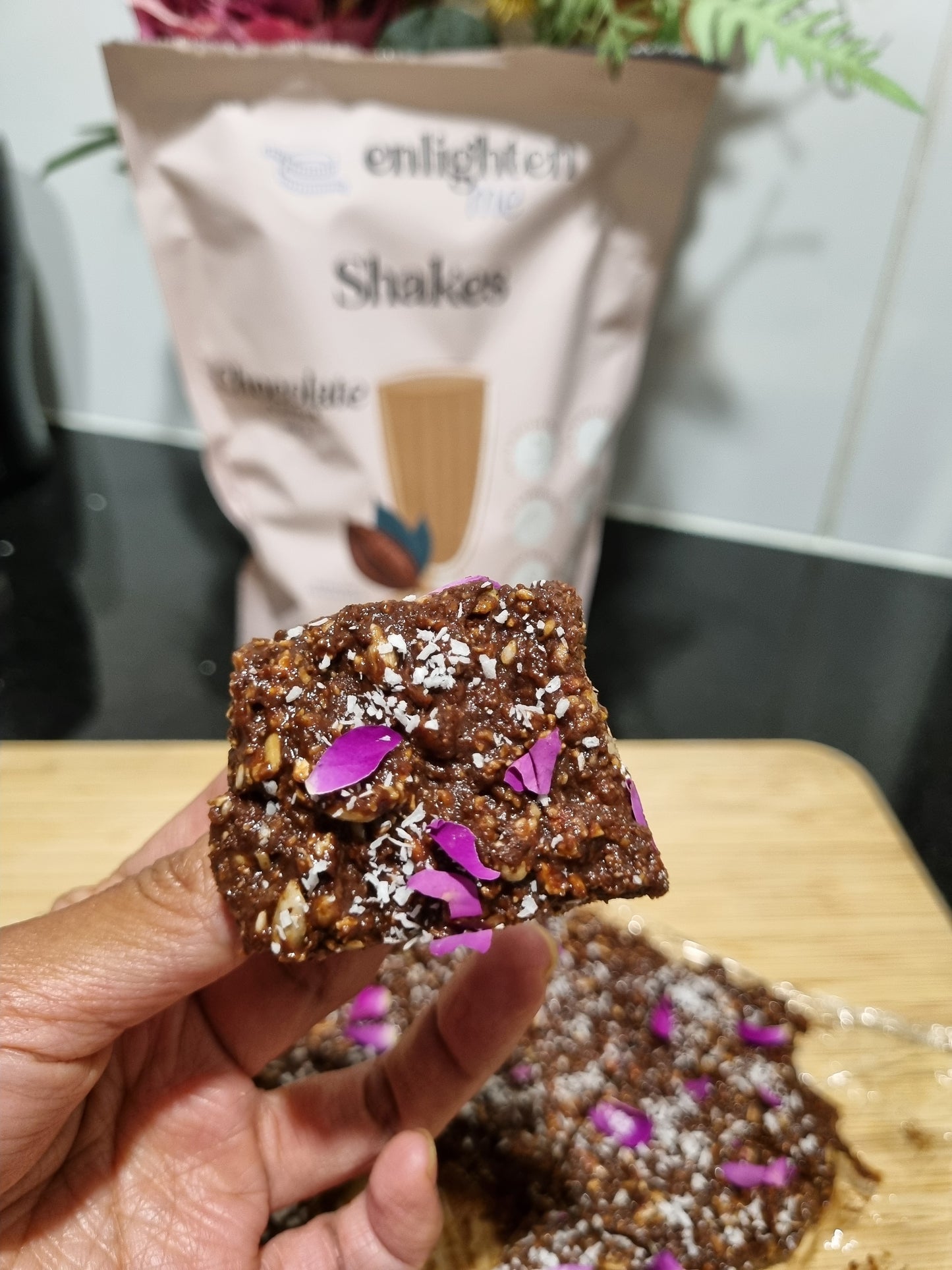
What are FODMAPs? And how FODMAP Friendly Shakes can help
Share
If you're someone currently managing Irritable Bowel Syndrome (IBS) or other gastrointestinal issues, you've likely heard of FODMAPs. But what exactly are they, and why are they important when managing symptoms like bloating, abdominal pain, and unpredictable bowel habits? Today's blog will dive deep into understanding FODMAPs, their role in IBS, and how carefully managing them can help alleviate symptoms. Plus, we’ll explore how meal replacement options like the Enlighten Me Shakes can be a great option for those following a low FODMAP diet.
What Are FODMAPs?
FODMAPs stand for Fermentable Oligosaccharides, Disaccharides, Monosaccharides, and Polyols. These are short-chain carbohydrates (or sugars) that are poorly absorbed in the small intestine. When FODMAPs reach the large intestine, they are fermented by bacteria, which can result in the production of gas and an increase in water in the digestive tract.
This can cause a range of symptoms, especially for those with a sensitive gut or underlying gastrointestinal conditions like irritable bowel syndrome.
To break it down further, FODMAPs are found in a wide variety of common foods, including:
- Oligosaccharides: These include fructans (found in wheat, onions, and garlic) and galacto-oligosaccharides (GOS) (found in legumes like chickpeas and lentils).
- Disaccharides: This group is made up of lactose, which is found in milk and dairy products.
- Monosaccharides: This includes fructose in excess of glucose, which is found in high-fructose fruits (like apples, pears, and watermelon) and sweeteners.
- Polyols: These include sorbitol, mannitol, maltitol, xylitol, and isomalt, which are often found in artificial sweeteners and certain fruits and vegetables. These naturally occurring sugars, when consumed in large amounts, can overwhelm the digestive system, especially for people with IBS, leading to uncomfortable symptoms.
What about Erythritol?
Erythritol can come from natural sources, which can make it confusing for many who are looking for a gut-friendly option that is FODMAP friendly.
Erythritol is also a polyol and therefore falls under the umbrella of a FODMAP.
How FODMAPs Affect IBS
For those with IBS, FODMAPs can aggravate symptoms like bloating, gas, diarrhoea, constipation, and abdominal pain. This happens because of two primary effects:
- Increased Water Retention: FODMAPs draw water into the intestines, which can alter bowel movements and cause discomfort.
- Gas Production: As FODMAPs are fermented by gut bacteria, they produce gas.
In sensitive individuals, this can lead to bloating, flatulence, and abdominal distension. In people with IBS, these reactions are often more pronounced because their gut is unusually sensitive to these foods. The resulting bloating or ‘stretching’ of the intestines can trigger painful symptoms, especially after consuming high-FODMAP foods.
The Low FODMAP Diet: A Relief Strategy
For individuals struggling with IBS symptoms, the Low FODMAP Diet can offer significant relief. By reducing or eliminating high FODMAP foods from the diet, many people experience improvements in their symptoms. The diet is not a one-size-fits-all solution, and it typically involves three phases:
- Elimination Phase (2-6 weeks) During this phase, high FODMAP foods are completely eliminated from the diet. This is the period when people often notice a reduction in their IBS symptoms as they remove common triggers such as wheat, dairy, certain fruits, and vegetables.
- Reintroduction Phase Once symptoms have improved, the next phase involves slowly reintroducing FODMAPs one at a time. This helps to identify which specific FODMAPs are triggers for each individual. It also allows individuals to determine their tolerance levels for different types of FODMAPs.
- Personalisation Phase The final phase is about personalising the diet. This involves finding a long-term eating plan that includes only the FODMAPs that can be tolerated while avoiding those that cause issues.
The goal is to create a sustainable diet that helps manage IBS symptoms without the need for strict elimination.
Why Is the Low FODMAP Diet So Important for IBS?
The Low FODMAP Diet has been clinically proven to reduce symptoms of IBS in a significant number of people. By eliminating the foods that contribute to bloating, gas, and discomfort, individuals can regain control over their symptoms and improve their overall quality of life.
It’s important to remember, though, that the Low FODMAP Diet is not a cure for IBS—rather, it’s a way to manage symptoms and avoid triggers. In fact, FODMAPs themselves aren’t the direct cause of IBS but can exacerbate symptoms for people who have a sensitive gut.
When you follow a Low FODMAP Diet, you're not just avoiding FODMAPs but also actively healing your gut by reducing the stress caused by excessive fermentation and bloating.
Common FODMAP Foods to Avoid
While the Low FODMAP Diet involves many dietary changes, a FODMAP Food List can help you navigate which foods to avoid. Some of the most common high FODMAP foods include:
- Fruits: Apples, pears, watermelon, stone fruits like peaches and plums.
- Vegetables: Onions, garlic, cauliflower, asparagus, mushrooms, and certain beans.
- Grains: Wheat, rye, and barley (though gluten-free alternatives can often be used).
- Dairy: Milk, yogurt, ice cream, and soft cheeses (due to high lactose content).
- Sweeteners: Sorbitol, xylitol, mannitol (often found in sugar-free gum and candies).
How to Make Following a Low FODMAP Diet Easier
For many people, the Low FODMAP Diet can be quite restrictive, especially during the elimination phase. When you're navigating a low FODMAP diet, achieving balanced meals can be difficult, and dining out becomes a challenge. One of the best ways to simplify meal planning during this period is by utilising FODMAP-friendly meal replacements.
This is where products like the Enlighten Me Shakes come in handy. These shakes can support those following the Low FODMAP Diet by providing a balanced, nutrient-rich meal option that doesn't exacerbate IBS symptoms.
Why I Formulated the Enlighten Me Shakes as FODMAP Friendly
As a General Practitioner who works closely with patients on their weight management journey, I noticed that many of my patients, especially those undergoing injectable medications for weight loss, were struggling with common gastrointestinal issues such as bloating, nausea, reflux, and alternating bowel habits.
These symptoms were often triggered by traditional meal replacement shakes that contained high levels of fructose or artificial sweeteners like erythritol, sorbitol, and xylitol—ingredients that are known to cause digestive distress in people with IBS. This is why I decided to formulate the Enlighten Me Shakes as FODMAP friendly.
By removing high-FODMAP ingredients and using high-quality, easy-to-digest components, the shakes provide a convenient, protein-rich, and nutritious option for those managing IBS while also supporting weight loss and muscle maintenance.
How the Enlighten Me Shakes Support Those on the Low FODMAP Diet
The Enlighten Me Shakes are carefully crafted to ensure they are gut-friendly and FODMAP friendly, making them an excellent choice for individuals following the Low FODMAP Diet. Some key features of the shake include:
- No Artificial Sweeteners: Unlike many other meal replacement shakes, the Enlighten Me Shakes avoid sweeteners like erythritol, sorbitol, and xylitol, which can trigger IBS symptoms.
- High-Quality Ingredients: The shakes contain high-quality protein, probiotics, and prebiotics, all while avoiding the use of high-FODMAP ingredients like fructose and certain dairy-based components.
- Gut-Friendly: Easy to digest due to the addition of digestive enzymes, probiotics and daily greens. Whilst some may worry when seeing ingredients such as broccoli and inulin (these can FODMAPs in large quantities, you can rest assured that the types and amounts added have been balanced, such that you can enjoy daily greens and a prebiotic that supports gut health—without triggering IBS symptoms.
- Convenient: The shakes offer a convenient, balanced meal that supports those on a restricted diet while ensuring they meet their nutritional needs during challenging phases of the Low FODMAP Diet. It’s especially helpful for those who struggle to find balanced meals when dining out or during the elimination phase.
Conclusion
The Low FODMAP Diet is a highly effective strategy to help navigate the nutritional challenge whilst juggling IBS symptoms and supporting overall gut health.
While it can be restrictive, especially during the elimination and reintroduction phases, tools like the Enlighten Me Shakes can provide relief for those struggling to maintain balanced meals.
With careful planning, the Enlighten Me Shakes can support your dietary needs while helping you manage your symptoms and improve your quality of life.
If you're considering the Low FODMAP Diet and need individualised advice, reach out to your local Dietitian or Healthcare provider. And for those looking to get started with a FODMAP friendly meal replacement shake in Australia, the Enlighten Me Shakes offer a certified FODMAP friendly solution, providing high-protein and nutrient-dense meals that will nourish your digestive system, rather than triggering it.
Check out the Enlighten Me Starter Bundle to get started today.












